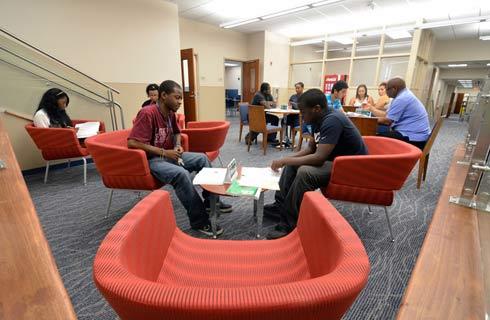Certificate in Arctic Studies

学历文凭
Advanced Certificate

专业院系
区域研究

开学时间

课程时长

课程学费

国际学生入学条件
For review and decision purposes only, we will accept academic records unofficially from you. If you receive an admission decision and choose to attend CU Boulder, you will be expected to provide your final official transcripts. If you are admitted while still attending classes, your final academic records will be required upon completion of the course work or program. Academic records written in languages other than English must be accompanied by a literal certified English translation. If school policy provides that all transcripts are issued in English, a native language transcript is not required.
For your secondary school attendance (grade 9 through grades 11, 12 or 13): submit all official academic records, transcripts, marksheets, or grade reports, and any certificates (including I/GCSE, AS, A level, Indian exam certificates), degrees, diplomas, or statements of graduation or completion. If you are currently attending secondary school, send all available records at this time, including a list of your courses in progress.
TOEFL: 75
IELTS: 6.5
Duolingo: 120
Total scores must include a TOEFL writing subscore of 19 or higher or an IELTS writing subscore of 5.5 or higher. Scores may not be combined.
For your secondary school attendance (grade 9 through grades 11, 12 or 13): submit all official academic records, transcripts, marksheets, or grade reports, and any certificates (including I/GCSE, AS, A level, Indian exam certificates), degrees, diplomas, or statements of graduation or completion. If you are currently attending secondary school, send all available records at this time, including a list of your courses in progress.
TOEFL: 75
IELTS: 6.5
Duolingo: 120
Total scores must include a TOEFL writing subscore of 19 or higher or an IELTS writing subscore of 5.5 or higher. Scores may not be combined.
IDP—雅思考试联合主办方

雅思考试总分
6.5
了解更多
- 雅思总分:6.5
- 托福网考总分:75
- 托福笔试总分:160
- 其他语言考试:Duolingo: 120
CRICOS代码:
申请截止日期:请 与IDP联系 以获取详细信息。
课程简介
The International Affairs Program (IAFS) offers an interdisciplinary undergraduate certificate in arctic studies, in collaboration with the Program in Nordic Studies (SCAN), the Program in Russian Studies (RUSS), the Department of Geography (GEOG), the Department of Environmental Studies (ENVS), the Department of Anthropology (ANTH), the Department of Ethnic Studies (ETHN) and the research entities of the Cooperative Institute for Research in Environmental Sciences (CIRES), the National Snow and Ice Data Center (NSIDC) and the Institute of Arctic and Alpine Research (INSTAAR).<br><br>This certificate prepares students to address pressing environmental, political and cultural issues in the far north. A laboratory for studying the effects of global climate change, the arctic region spans three continents, with territories in Canada, Greenland (Denmark), Finland, Iceland, Norway, Sweden, Russia and the United States. Its population exhibits considerable ethnic, linguistic, and sociopolitical diversity, and contains numerous indigenous peoples. Issues as critical as nationalism, territorial rights and law, security, economic development and resource technology place the arctic at the center of global, regional and national interests. Further, the region's natural and social characteristics have inspired influential and enduring expressive cultureproduced by locals and outsidersfrom antiquity to the present.
相关申请

预科

奖学金

实习机会

在校学习

跨境学习

校园授课-线上开始

在线/远程学习
学校排名
世界排名
124
数据源:泰晤士高等教育世界大学排名
关于科罗拉多大学博尔德分校

科罗拉多大学波德分校成立于1877年,是落基山地区优秀的综合性研究型大学,该校的自然科学、工程学、商务、法律、艺术、人文、教育、音乐等学科尤为突出。科罗拉多大学波德分校校园景色壮观美丽,吸引了一流的师资和来自世界各自的莘莘学子,共同构建了一个充满活力的校园环境。科罗拉多大学波德分校距离卡罗拉多州首府丹佛仅30英里(48公里)只需短程驾车便可达到美国发展最快的城市之一。由于临近丹佛,科罗拉多大学波德分校也接近许多主要的文化圣地、有许多实习和工作机会。学校附近的实习和工作单位:IBM、波音、谷歌。科罗拉多大学波德分校是久负盛名的“美国大学协会”的34 所公立大学之一,是一所具有卓越学术和尖端科研的美国顶级高校。该校强大的校友网、与龙头企业密切合作、高排名的学术成就、丰富的校园及社区活动为学生学业及未来职业发展提供了无限机遇。
本校相关课程
戏剧与表演研究哲学博士

学历文凭
Ph.D.
下一个开始日期
课程费用总额
戏剧和表演研究文学硕士

学历文凭
Masters Degree
下一个开始日期
课程费用总额
工商管理硕士/电信科学硕士

学历文凭
Double Major Degree
下一个开始日期
课程费用总额
技术,媒体与社会哲学博士

学历文凭
Ph.D.
下一个开始日期
课程费用总额
技术,媒体和社会科学硕士-创意技术和设计(CTD)

学历文凭
Masters Degree
下一个开始日期
课程费用总额
听力学博士学位

学历文凭
Ph.D.
下一个开始日期
课程费用总额
其他相关课程
Master of Arts in Intercultural German Studies

滑铁卢大学
泰晤士高等教育世界大学排名:

学历文凭
Masters Degree
下一个开始日期
课程费用总额
英语文学硕士-文学研究(课程工作)

滑铁卢大学
泰晤士高等教育世界大学排名:

学历文凭
Masters Degree
下一个开始日期
课程费用总额
性文学士

滑铁卢大学
泰晤士高等教育世界大学排名:

学历文凭
Bachelor Degree
下一个开始日期
课程费用总额
宗教学文学士[一般]

滑铁卢大学
泰晤士高等教育世界大学排名:

学历文凭
Bachelor Degree
下一个开始日期
课程费用总额
欧洲研究文学士学位

达尔豪斯大学
泰晤士高等教育世界大学排名:

学历文凭
Bachelor Degree
下一个开始日期
课程费用总额
加拿大研究文学士学位

达尔豪斯大学
泰晤士高等教育世界大学排名:

学历文凭
Bachelor Degree
下一个开始日期
课程费用总额




